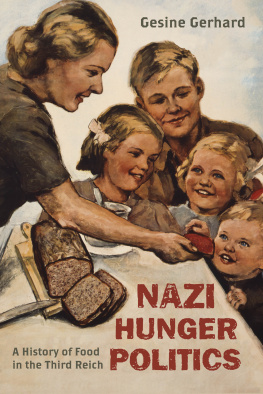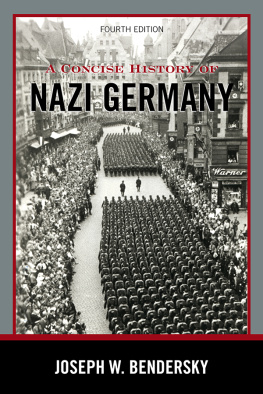Bureaucracy, Work and Violence
BUREAUCRACY, WORK AND VIOLENCE
The Reich Ministry of Labour in Nazi Germany, 19331945
Edited by
ALEXANDER NTZENADEL
Translated by Alex Skinner

Published in 2020 by
Berghahn Books
www.berghahnbooks.com
English-language edition
2020 Berghahn Books
German-language edition
2017 Wallstein Verlag, Gttingen
Originally published in German as
Das Reichsarbeitsministerium im Nationalsozialismus. Verwaltung Politik Verbrechen
The translation of this work was funded by the Federal Ministry of Labour and Social Affairs.
All rights reserved. Except for the quotation of short passages for the purposes of criticism and review, no part of this book may be reproduced in any form or by any means, electronic or mechanical, including photocopying, recording, or any information storage and retrieval system now known or to be invented, without written permission of the publisher.
Library of Congress Cataloging-in-Publication Data
Names: Ntzenadel, Alexander, editor. | Germany. Unabhngige Historikerkommission zur Geschichte des Reichsarbeitsministeriums 19331945.
Title: Bureaucracy, Work and Violence: The Reich Ministry of Labour in Nazi Germany, 19331945 / edited by Alexander Ntzenadel; translated by Alex Skinner.
Other titles: Reichsarbeitsministerium im Nationalsozialismus. English.
Description: First edition. | New York: Berghahn Books, 2020. | Includes bibliographical references and index.
Identifiers: LCCN 2020005044 (print) | LCCN 2020005045 (ebook) | ISBN 9781789204582 (hardback) | ISBN 9781789204599 (ebook)
Subjects: LCSH: Germany. Reichsarbeitsministerium. | National socialism and labor. | Labor policyGermany. | GermanySocial policy. | GermanyPolitics and government19331945.
Classification: LCC HD8455 .R4513 2020 (print) | LCC HD8455 (ebook) | DDC 331.12/042094309043dc23
LC record available at https://lccn.loc.gov/2020005044
LC ebook record available at https://lccn.loc.gov/2020005045
British Library Cataloguing in Publication Data
A catalogue record for this book is available from the British Library.
ISBN 978-1-78920-458-2 hardback
ISBN 978-1-78920-459-9 ebook
CONTENTS
Alexander Ntzenadel
Ulrike Schulz
Lisa-Maria Rhling
Rdiger Hachtmann
Karl Christian Fhrer
Alexander Klimo
Sren Eden
Henry Marx
Kiran Klaus Patel and Sandrine Kott
Elizabeth Harvey
Swantje Greve
Michael Wildt
Kim Christian Priemel
Martin Mnzel
FIGURES AND TABLES
Figures
Tables
PREFACE
This volume presents the results of the research carried out by the Independent Commission of Historians Investigating the History of the Reich Ministry of Labour in the National Socialist Period. The commission was convened in April 2013 by the Federal Ministry of Labour and Social Affairs (Bundesministerium fr Arbeit und Soziales), to analyse the history of the ministry during the Third Reich on the basis of a comprehensive study of the existing archival sources. The present volume is supplemented by five research monographs dedicated to the development of the bureaucratic apparatus of the ministry and to specific fields of labour and social policy in the Nazi period.
The commissions research was guided by three major principles. First, the project aims to go beyond a classical institutional history and explore the politics and policies of the Reich Ministry of Labour (Reichsarbeitsministerium). The objective is to write a modern administrative history that analyses state institutions and bureaucratic practices within their particular historical environment. This volume brings together perspectives from political, cultural and social history and explores the interplay between institutional structures, administrative decision-making and bureaucratic knowledge under the conditions of totalitarian dictatorship.
Second, the project is not limited to the period between 1933 and 1945, but analyses the development of the Ministry of Labour within the overarching trends and continuities of German history. While most recent projects on state institutions in the Nazi period have concentrated on the continuities in personnel and policy after 1945, we also examine the transition from the Weimar Republic to Nazism in order to understand the role played by the Third Reich in the development of the German welfare state in the twentieth century. This requires a nuanced approach that eschews a focus on individual personalities and instead considers German welfare and administrative experts and officials as a social group, analysing them within their specific institutional context. Third, the project aims to analyse the Ministry of Labour beyond a purely German perspective. We thus explore the transnational and comparative aspects of Nazi social policy, casting light on the imperial ambitions of the Third Reich in Europe. This applies not just to the phenomenon of forced labour but also to the use of labour and social policy as an instrument for cementing German hegemony within Europe over the long term.
This volume is the product of a collaborative venture, which was enriched by input from a wide range of individuals in addition to the authors. The student assistants of our project made a significant contribution, particularly when it came to accessing and trawling through the extensive archival sources and acquiring literature. Our thanks go to Celeste Copes, Alexander Dietz, Johan Moosleitner, Julian Nindl, Viktoria Peymann, Lisa-Maria Rhling, Hannes Schrader, Daniel Stienen and Mischa Weber for their energetic assistance during various phases of the project.
We also benefited greatly from the expert advice and support of Matthias Meissner (Federal Archive [Bundesarchiv] Berlin-Lichterfelde), Dieter G. Maier and Stefan Pabst (SEAD-BA Sammlung der Bundesagentur fr Arbeit zur Entwicklung der Arbeitsverwaltung in Deutschland [Collection of the Federal Employment Agency on the Development of the Labour Administration in Germany]) and Andreas Grindau (Federal Ministry for Economic Affairs and Energy [Bundesministerium fr Wirtschaft und Energie]).
Many external scholars supported the project in an advisory capacity. We would particularly like to thank Johannes Bhr, Karl Christian Fhrer, Ute Frevert, Neil Gregor, Ulrich Herbert, Hans Gnter Hockerts, Jrgen Kocka, Stefan Khl, Daniela Liebscher, Karsten Linne, Stefanie Middendorf, Jrg Raab, Sabine Rudischhauser (), Carola Sachse, Wolfgang Schieder, Christine Schoenmakers, Wolfgang Seibel and Winfried Sss.
We owe a debt of gratitude to Andreas Mix, Martin Mnzel, Kim Christian Priemel and Paul Rehfeld for their contribution to the preliminary study conducted at the Chair in Social and Economic History, Humboldt University of Berlin.
Our thanks also to Aurlie Denoyer, Andrej Doronin, Nicola DElia, Ralf Futselaar, kos Krbin, Iryna Kashtalian, Vlad Paca, Charel Roemer, Christine Strotmann and Radka ustrov, who laid the ground for research in non-German archives.
We are also grateful to Frau Jutta Mhlenberg for her meticulous copy-editing of the original German volume, and to Hajo Gevers at Wallstein Verlag for supervising the book series of which the German volume forms part. We would like to express our gratitude to Alex Skinner for the translation and to Stephen Grynwasser for the English copy-editing.
Next page








